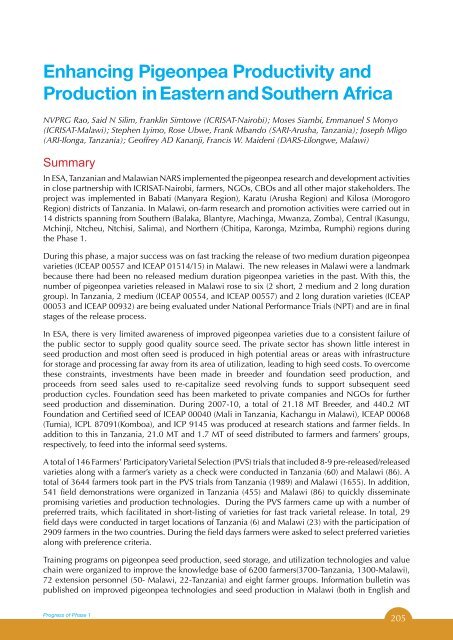Final version of Tropical Legumes II Project Report for Phase 1 - icrisat
Final version of Tropical Legumes II Project Report for Phase 1 - icrisat
Final version of Tropical Legumes II Project Report for Phase 1 - icrisat
Create successful ePaper yourself
Turn your PDF publications into a flip-book with our unique Google optimized e-Paper software.
Enhancing Pigeonpea Productivity and<br />
Production in Eastern and Southern Africa<br />
NVPRG Rao, Said N Silim, Franklin Simtowe (ICRISAT-Nairobi); Moses Siambi, Emmanuel S Monyo<br />
(ICRISAT-Malawi); Stephen Lyimo, Rose Ubwe, Frank Mbando (SARI-Arusha, Tanzania); Joseph Mligo<br />
(ARI-Ilonga, Tanzania); Ge<strong>of</strong>frey AD Kananji, Francis W. Maideni (DARS-Lilongwe, Malawi)<br />
Summary<br />
In ESA, Tanzanian and Malawian NARS implemented the pigeonpea research and development activities<br />
in close partnership with ICRISAT-Nairobi, farmers, NGOs, CBOs and all other major stakeholders. The<br />
project was implemented in Babati (Manyara Region), Karatu (Arusha Region) and Kilosa (Morogoro<br />
Region) districts <strong>of</strong> Tanzania. In Malawi, on-farm research and promotion activities were carried out in<br />
14 districts spanning from Southern (Balaka, Blantyre, Machinga, Mwanza, Zomba), Central (Kasungu,<br />
Mchinji, Ntcheu, Ntchisi, Salima), and Northern (Chitipa, Karonga, Mzimba, Rumphi) regions during<br />
the <strong>Phase</strong> 1.<br />
During this phase, a major success was on fast tracking the release <strong>of</strong> two medium duration pigeonpea<br />
varieties (ICEAP 00557 and ICEAP 01514/15) in Malawi. The new releases in Malawi were a landmark<br />
because there had been no released medium duration pigeonpea varieties in the past. With this, the<br />
number <strong>of</strong> pigeonpea varieties released in Malawi rose to six (2 short, 2 medium and 2 long duration<br />
group). In Tanzania, 2 medium (ICEAP 00554, and ICEAP 00557) and 2 long duration varieties (ICEAP<br />
00053 and ICEAP 00932) are being evaluated under National Per<strong>for</strong>mance Trials (NPT) and are in final<br />
stages <strong>of</strong> the release process.<br />
In ESA, there is very limited awareness <strong>of</strong> improved pigeonpea varieties due to a consistent failure <strong>of</strong><br />
the public sector to supply good quality source seed. The private sector has shown little interest in<br />
seed production and most <strong>of</strong>ten seed is produced in high potential areas or areas with infrastructure<br />
<strong>for</strong> storage and processing far away from its area <strong>of</strong> utilization, leading to high seed costs. To overcome<br />
these constraints, investments have been made in breeder and foundation seed production, and<br />
proceeds from seed sales used to re-capitalize seed revolving funds to support subsequent seed<br />
production cycles. Foundation seed has been marketed to private companies and NGOs <strong>for</strong> further<br />
seed production and dissemination. During 2007-10, a total <strong>of</strong> 21.18 MT Breeder, and 440.2 MT<br />
Foundation and Certified seed <strong>of</strong> ICEAP 00040 (Mali in Tanzania, Kachangu in Malawi), ICEAP 00068<br />
(Tumia), ICPL 87091(Komboa), and ICP 9145 was produced at research stations and farmer fields. In<br />
addition to this in Tanzania, 21.0 MT and 1.7 MT <strong>of</strong> seed distributed to farmers and farmers’ groups,<br />
respectively, to feed into the in<strong>for</strong>mal seed systems.<br />
A total <strong>of</strong> 146 Farmers’ Participatory Varietal Selection (PVS) trials that included 8-9 pre-released/released<br />
varieties along with a farmer’s variety as a check were conducted in Tanzania (60) and Malawi (86). A<br />
total <strong>of</strong> 3644 farmers took part in the PVS trials from Tanzania (1989) and Malawi (1655). In addition,<br />
541 field demonstrations were organized in Tanzania (455) and Malawi (86) to quickly disseminate<br />
promising varieties and production technologies. During the PVS farmers came up with a number <strong>of</strong><br />
preferred traits, which facilitated in short-listing <strong>of</strong> varieties <strong>for</strong> fast track varietal release. In total, 29<br />
field days were conducted in target locations <strong>of</strong> Tanzania (6) and Malawi (23) with the participation <strong>of</strong><br />
2909 farmers in the two countries. During the field days farmers were asked to select preferred varieties<br />
along with preference criteria.<br />
Training programs on pigeonpea seed production, seed storage, and utilization technologies and value<br />
chain were organized to improve the knowledge base <strong>of</strong> 6200 farmers(3700-Tanzania, 1300-Malawi),<br />
72 extension personnel (50- Malawi, 22-Tanzania) and eight farmer groups. In<strong>for</strong>mation bulletin was<br />
published on improved pigeonpea technologies and seed production in Malawi (both in English and<br />
Progress <strong>of</strong> <strong>Phase</strong> 1<br />
205
















